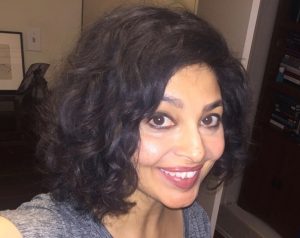Farah Godrej
Senior Fellow, Center for Ideas and Society, 2017-2020
 Department: Political Science
Department: Political Science
Rank: Associate Professor
Years at UCR: 12
Favorite places: Walking the Huntington Gardens in Pasadena, or strolling the coast along the Pacific Ocean. Staring at nature, whether in the form of plants, trees, fauna, or water, is a crucially rejuvenating practice.
Top three texts I would take to a desert island:
* A “wisdom” text: The Bhagavad-Gita, the self-inquiry manual I turn to again and again.
* An “intellectual” text: Karl Marx’s The Economic and Philosophic Manuscripts of 1844, which reminds us what human flourishing really looks like.
* A “comfort” text: anything by Enid Blyton (with a particular fondness for the “Mallory Towers” series), whose distintinctly English approach to children’s literature was a staple of my childhood in postcolonial India.
Summarize your research in one sentence:
My research seeks to uncover what happens to traditions like yoga and meditation when they travel from their point of origin in the Indian subcontinent, and take on new life in other times and places.
Why study yoga?
Self-care practices like yoga and meditation have now become part of a global discourse on wellness, health, and well-being. It’s easy to think of these practices as largely benign, nonviolent, peaceful and even countercultural. But less is known about the darker and more insidious side of these practices—can they function as instruments of social control in increasingly inegalitarian social and political contexts? My research shows that depending on how they are taught and disseminated, these practices can produce responses toward injustice that are either passive, compliant and docile on the one hand, or revolutionary, insurrectionist and empowering on the other.
Do you practice yoga? If so, what kind and for how many years?
I have been studying many different styles of yoga, for about twenty years. I consider myself a lifelong student of a wide variety of yogic traditions, and have been influenced most by the Iyengar and Ashtanga styles of postural practice, although I continue to train in and study many other postural styles and lineages. I also continue my decades-long study of a variety of meditative lineages, such as Kadampa and Shambhala Buddhism, vipassana, Siddha Yoga, kundalini yoga, and various secular, nondenominational variants of these practices by Western teachers such as Eckhart Tolle and Sally Kempton. My course, “The Yogic and Meditative Traditions of South Asia,” aims to give students a basic introduction to the wide array of yogic and meditative practices, especially as they evolve and travel to the West in contemporary times.
You recently received an award. Can you tell us about it?
Last year, I was awarded the University’s highest teaching honor, the Campus Distinguished Teaching Award for 2017-18. This was perhaps the greatest highlight of my twelve years at UCR, and the most rewarding moment of my career thus far.
Any tips or insights on teaching you can share?
My students can learn as much from each other as they can from me: having the confidence to both believe in and express your own views is a learned skill. Pedagogically, I owe it to them to instill this confidence in themselves, and to foster an environment in which they learn to respect themselves, not shy away from the sound of their own voice, or devalue their own intellect, while also learning to value others’ views in the same way. The transmission of information is only one aspect of our job as educators, and the true goal is for us to impart a certain kind of “humanness” and human flourishing through our dialogical interactions with them.
A favorite podcast that you encourage students to download…
Season 3 of the podcast Serial which takes us inside the most ordinary cases in the Cleveland court system, putting the absurdity and brokenness of our criminal justice system on full display.
—
In Focus is a new interview series that features faculty associates of the Center for Ideas and Society.
